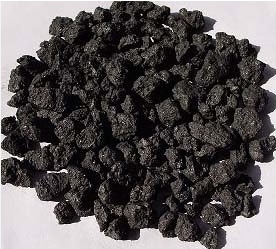Calcined petroleum coke, often referred to as calcined petcoke, is a critical ingredient in the production of aluminum and steel. It is a high-carbon material derived from petroleum refining, known for its high purity and physical properties such as hardness and density. This article will shed light on the concept of bulk density, particularly in the context of calcined petroleum coke.
What is Bulk Density?
Bulk density is defined as the mass of a bulk material divided by the volume it occupies, including the interparticulate void volume. This property is essential for many industrial applications because it impacts material handling, storage, and usage. Bulk density is typically expressed in kilograms per cubic meter (kg/m³) or pounds per cubic foot (lb/ft³).

Calcined Petroleum Coke and its Bulk Density
Calcined petroleum coke undergoes a series of treatments, including heating known as calcination, to rid it of impurities and enhance its physical properties. One of these properties is the bulk density. The bulk density of calcined petroleum coke is critical as it affects aspects such as material handling, storage, and usage in various industrial processes. It is to note that the bulk density of calcined petcoke depends on several factors including its particle size distribution and the level of calcination.
Factors Affecting the Bulk Density of Calcined Petcoke
- Particle Size: The particle size distribution of calcined petroleum coke directly affects its bulk density. Generally, finer particles lead to higher bulk density as they can pack more closely together, reducing the void spaces between particles.
- Level of Calcination: The degree of calcination can also influence the bulk density of calcined petroleum coke. Higher calcination temperatures result in a more crystalline structure that tends to possess a higher density.
Importance of Bulk Density in Industrial Applications
The bulk density of calcined petroleum coke is an essential property in several ways:
- Material Handling: The bulk density impacts the handling and transportation of calcined petroleum coke. Higher bulk density materials can be heavy and may require specialized equipment for transportation and handling.
- Storage: Bulk density plays a crucial role in the storage of calcined petroleum coke. Materials with higher bulk density occupy less space, allowing for more efficient storage solutions. Additionally, understanding the bulk density is essential for designing storage facilities that can withstand the weight of the stored material.
- Usage in Industrial Processes: The bulk density of calcined petroleum coke affects its performance in various industrial processes, such as the production of aluminum and steel. For instance, in the aluminum industry, the bulk density of calcined petcoke influences the anode quality and the efficiency of the electrolysis process. Similarly, in the steel industry, the bulk density of calcined petcoke impacts the quality of the final product and the efficiency of the manufacturing process.
Measuring the Bulk Density of Calcined Petroleum Coke
There are several methods to measure the bulk density of calcined petroleum coke, including the following:
- Loose Bulk Density: This method involves filling a container with the calcined petroleum coke without any compaction. The mass of the material is then divided by the volume of the container to obtain the loose bulk density.
- Tapped Bulk Density: In this method, the container is filled with calcined petroleum coke and then tapped on a hard surface to compact the material. The mass of the compacted material is divided by the volume of the container to determine the tapped bulk density.
- Geometric Mean Bulk Density: This method calculates the geometric mean of the loose and tapped bulk densities to obtain a more accurate representation of the bulk density of calcined petroleum coke.
Conclusion
In summary, the bulk density of calcined petroleum coke is a critical property that influences material handling, storage, and usage in various industrial applications. Factors such as particle size distribution and the level of calcination can impact the bulk density of calcined petcoke. Understanding and accurately measuring the bulk density is essential for optimizing industrial processes and ensuring the quality of the final products.



Write a Message